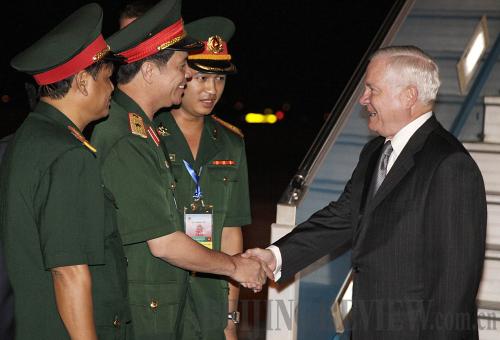|
 |
|
CLOSER MILITARY RELATIONS: Vietnamese officials greet U.S. Defense Secretary Robert Gates upon his arrival in Hanoi for a visit on October 10 The author is a researcher with the China Institutes of Contemporary International Relations 10 (XINHUA/AFP) |
Hillary Clinton's Viet Nam trip helped to explain the U.S. stance. Washington plans to establish stable relationships with India and Viet Nam to deter China. This reflects the duality of U.S. policy, which fluctuates between cooperation and containment.
After announcing a return to Southeast Asia, Washington conducted a series of acts to enlarge its involvement in the region, including holding the first U.S.-ASEAN summit and joining the EAS. Due to Viet Nam's important geopolitical location, the United States considers Viet Nam to be key to containing Chinese influence. It will use Viet Nam's growing influence in ASEAN to attempt to interfere in the South China Sea issue and East Asia cooperation, so as to prevent Chinese influence from growing.
Viet Nam, on the other hand, hopes to use the United States to gain more influence in regional and international affairs. Common strategic interests have quickly moved the bilateral relationship to new heights. Their improving relationship is based on long-term interests, and has not been rushed.
Not a triangle
There are still many obstacles to the development of the U.S.-Viet Nam relationship. The Viet Nam War will always cast a long shadow. Unable to fully forget the pain of the war, Viet Nam welcomes some U.S. military cooperation, but opposes the stationing of U.S. military forces in the country and told the United States it could not rent the Cam Ranh Bay as a military base. Also, the United States continually criticizes Viet Nam's human rights and political conditions. The U.S. media believe Viet Nam cannot become a reliable partner until it realizes "democracy" and "freedom."
Chinese elements will also influence the developing relationship. Economic, geographic and political conditions mean Viet Nam must rely on China. Many Vietnamese officials believe China has set a good economic and political example for Viet Nam, and would never want to risk a direct collision with China.
Viet Nam pays great attention to balancing China and the United States, and cares about continuing a relationship with China while developing relations with the United States. For example, during the ARF in July, Viet Nam arranged for the general secretary of the Communist Party of Viet Nam Central Committee to meet with the Chinese foreign minister and its prime minister to meet with the U.S. secretary of state. The arrangement showed it cherishes the relationship with China. It believes that although China and the United States have disputes on certain issues, long-term cooperation is a common desire. Since the two large countries are unlikely to encounter serious frictions in the near future, Viet Nam believes it would be unwise to favor either.
Viet Nam will keep a skillful balance between China and the United States. The country's Vice Defense Minister Nguyen Chi Vinh stressed on August 25 that Viet Nam would never be a military ally of any country. He said his country would not rely on the United States to reach goals, and said the world should not view the relationships among Viet Nam, China and the United States as a triangle. The Viet Nam-China relationship is quite different from the Viet Nam-U.S.—or any other—relationship. This quite clearly reflects Viet Nam's diplomatic policy.
The author is a researcher with the China Institutes of Contemporary International Relations
| 